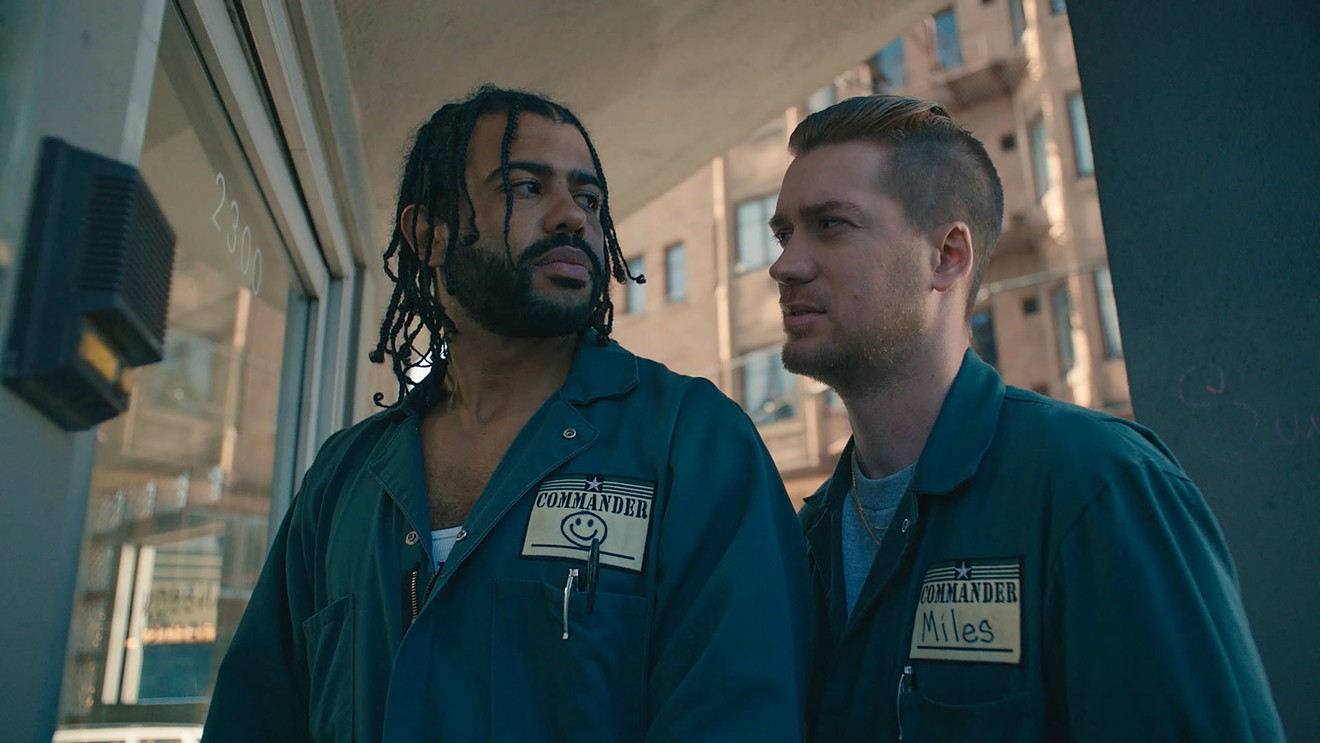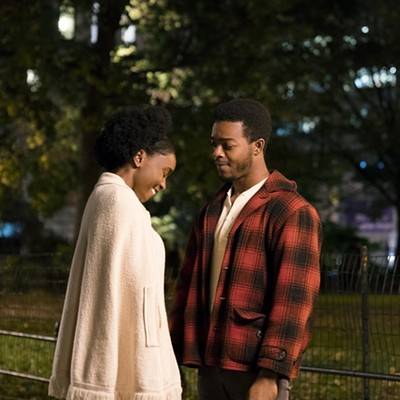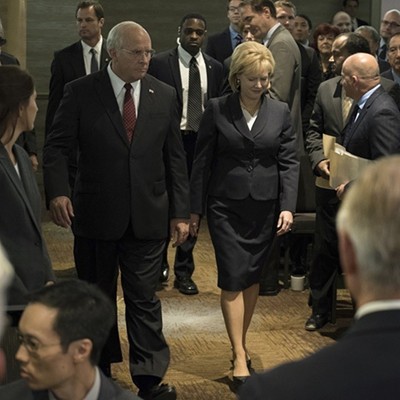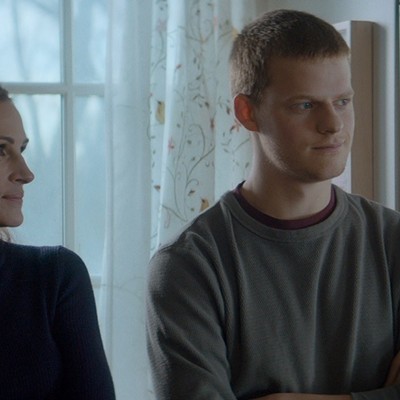With apologies to Gertrude Stein, there actually is a there there in Oakland, California. In fact, that polyglot city pulses with a mad glut of there, one there butting against another butting against theres still to come. There’s so much there there that to capture their town’s complexities, this summer’s two bold Oakland features — first Boots Riley’s scabrous capitalist satire Sorry to Bother You and now Carlos Lopez Estrada’s street-level city-study Blindspotting – both dash to the rocks the established rules of genre and dramatic naturalism. Riley’s film risks losing viewers with a lurch from consciousness-raising workers’ comedy into paranoid science fiction, but how better to suggest the craziness of a city known for revolutionary fervor — all those anarchists’ bookstores and black-power bakeries — getting swallowed by “visionary” tech bros?
And now, here’s the superb and daring Blindspotting, a thrilling, riotous, language-drunk elegy and celebration for this most unfixed of cities. The film, like Oakland itself, is forever evolving, always becoming some new thing just when it at last seems to have revealed its full self. Like Riley, the film’s writers and producers dare to demand that audiences give them poetic license, in this case literally.
It takes a lot of movie to get at Oakland’s truth. Blindspotting is, among other things:
1. A tender and hilarious character study of two neighborhood friends — played by the film’s writers and producers, Daveed Diggs and Rafael Casal — who work for a moving company, try not to run afoul of the law, have strikingly different reactions to gentrification and process everything bewildering or beautiful or upsetting in their lives by spitting casual, exploratory rhymes toward each other. Their friendship is a vital, endless freestyle. Collin (the electric Diggs) is a black man with braids living in a halfway house as he nears the end of his parole for a felony assault; he kind of likes the $10 kale juice now stocked at his local bodega. Miles (an explosive Casal), a white boy wearing a grill and packing a pistol, disdains change in Oakland, especially once the hipsters start taking him for one of them rather than a town lifer who is treated, by his friends and life partner Ashley (Jasmine Cephas Jones), as almost honorarily black. They refer to him by a word that he wisely doesn’t speak himself.
2. A piercing melodrama about race and class, identity and expectations, about what the world sees and expects when it looks at you, about how hard it is, when you’ve been raised in this culture and steeped in its pathologies, to see people as who they are rather than who you expect or fear. At times, the broke-ass speechifying gets old-school theatrical, Arthur Miller and Elia Kazan meet slam poetry, especially in a bravura confrontation between Collin and Miles about everything the other hasn’t considered about what it’s like to be a black dude with braids — or a white dude who projects as “black” — in Oakland.
3. An impassioned city symphony that toasts and laments an Oakland that’s already passing, alive with blazing street photography and attuned in its incidental encounters to contradiction and irony. We meet a white artist, played by Wayne Knight, whose work honors the people displaced by gentrification — and also the oak trees cut down to pave the Oakland that’s now being lost. And witness the priceless moment when Collin's mother (Margo Hall), whose home is bedecked with African drums and photos of Angela Davis, vows not to join the exodus of longtime residents outpriced by tech execs: “I’ll be damned if I move out of this neighborhood now that they got good food and shit.”
4. A theatrical throwdown in which the stars and writers — both mainstays of innovative stage and spoken-word communities — liberate themselves from cinematic convention and audience expectation. To bull’s-eye Oakland reality, they break with blinkered and limited movie realism. They’ve penned elaborate dream and performance sequences that feature the leads soliloquizing in ferocious verse. The first of these is a searing nightmare, a burst of music-video horror on the subjects of police brutality, mass incarceration and a government that only wants to hear from men like Collin when they are offering “verbal acknowledgment” of that government’s instructions. The second is more complex, a fireworking display of Diggs’ virtuosity that occurs within the story’s everyday reality and arrives just when audiences will be braced for a more traditional climax — likely a bloody one. Instead, they get rhyme. “That would never happen in real life,” a viewer groused afterward, the second time I saw the film. Of course it wouldn’t – and don’t think the filmmakers are unaware of that. A much more fruitful line of inquiry is, “Why does it happen here?” and, “Why is it easier for audiences to buy fantasies of killing than fantasies of truth-telling?”
Blindspotting is all these things and more. Much more: It’s wild and singular, often beautiful, a feast and feat of self-definition through verbal dexterity. It’s shaking with laughter, teeming with insights and tense as hell when the police roll up. (Cheers to director of photography Robby Baumgartner’s lensing of mini-marts and new condos, of gutted homes and neon vegan burger joints, of lifted baller cars and sunrise jogs through a cemetery.) Focusing on its leads’ neighborhood and their day-to-day hustle, it doesn’t seize all that’s there in Oakland, but it gets more onscreen than most movies ever could. And if you find yourself resisting its occasional flights into the symbolic or theatrical, let me ask this: Would something more like every other movie be any more satisfying? Isn’t the most Oakland thing of all to do it their way and dare us to keep up? Blindspotting brilliantly surveys its creators’ home turf while also breaking new ground.
Support Us
Houston's independent source of
local news and culture
account
- Welcome,
Insider - Login
- My Account
- My Newsletters
- Contribute
- Contact Us
- Sign out
The Essential Blindspotting Insists That People, Cities and Movies Can’t Be Reduced
Alan Scherstuhl July 17, 2018 9:00AM

Daveed Diggs (left) as Collin and Rafael Casal as Miles play two neighborhood friends who work for a moving company while trying not to run afoul of the law in Blindspotting, Carlos Lopez Estrada’s street-level city-study.
Courtesy of Lionsgate
[
{
"name": "Related Stories / Support Us Combo",
"component": "11591218",
"insertPoint": "4",
"requiredCountToDisplay": "4"
},{
"name": "Air - Billboard - Inline Content",
"component": "11591214",
"insertPoint": "2/3",
"requiredCountToDisplay": "7"
},{
"name": "R1 - Beta - Mobile Only",
"component": "12287027",
"insertPoint": "8",
"requiredCountToDisplay": "8"
},{
"name": "Air - MediumRectangle - Inline Content - Mobile Display Size 2",
"component": "11591215",
"insertPoint": "12",
"requiredCountToDisplay": "12"
},{
"name": "Air - MediumRectangle - Inline Content - Mobile Display Size 2",
"component": "11591215",
"insertPoint": "4th",
"startingPoint": "16",
"requiredCountToDisplay": "12"
}
,{
"name": "RevContent - In Article",
"component": "12527128",
"insertPoint": "3/5",
"requiredCountToDisplay": "5"
}
]
KEEP THE HOUSTON PRESS FREE...
Since we started the Houston Press, it has been defined as the free, independent voice of Houston, and we'd like to keep it that way. With local media under siege, it's more important than ever for us to rally support behind funding our local journalism. You can help by participating in our "I Support" program, allowing us to keep offering readers access to our incisive coverage of local news, food and culture with no paywalls.
Alan Scherstuhl is film editor and writer at Voice Media Group. VMG publications include Denver Westword, Miami New Times, Phoenix New Times, Dallas Observer, Houston Press and New Times Broward-Palm Beach.
Contact:
Alan Scherstuhl
Follow:
Twitter:
@studiesincrap
Trending Film
- International Film Festival 2000
- Jonah Hill’s Mid90s Takes an Honest Plunge Into the Millennial Past
- Speed Racer Is a Fast Track to Nowhere
-
Sponsored Content From: [%sponsoredBy%]
[%title%]

Don't Miss Out
SIGN UP for the latest
news, free stuff and more!
Become a member to support the independent voice of Houston
and help keep the future of the Houston Press FREE
Use of this website constitutes acceptance of our
terms of use,
our cookies policy, and our
privacy policy
The Houston Press may earn a portion of sales from products & services purchased through links on our site from our
affiliate partners.
©2024
Houston Press, LP. All rights reserved.





